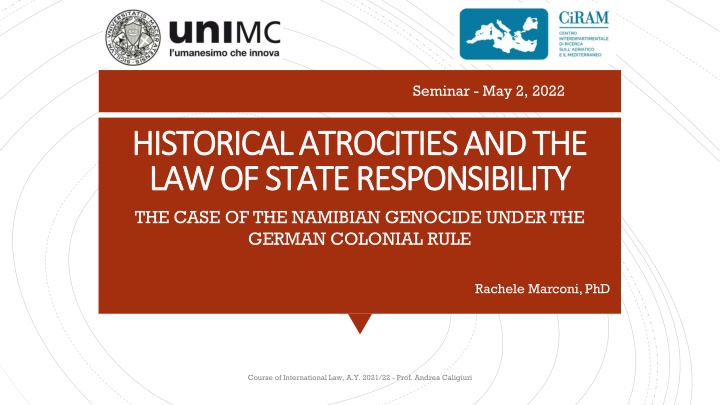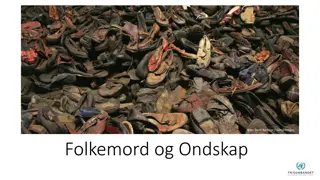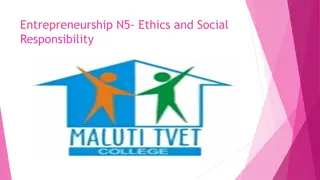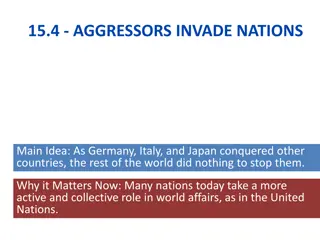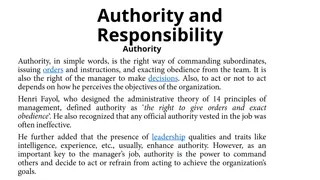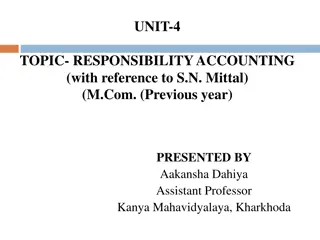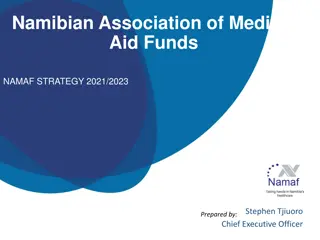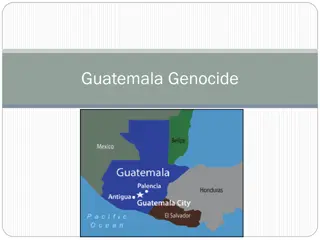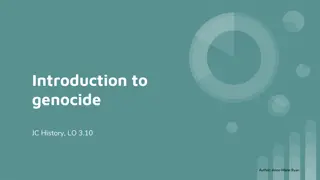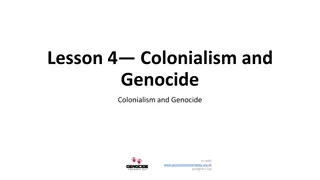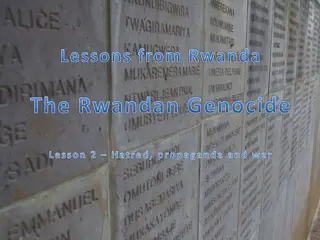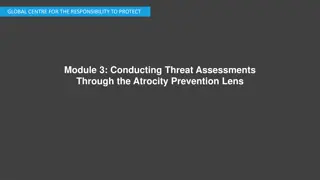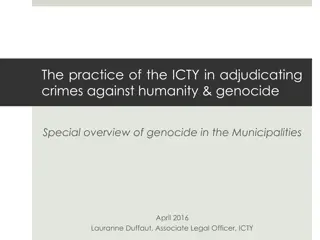Historical Atrocities and State Responsibility: Namibian Genocide Seminar
Explore the legal analysis of the Namibian Genocide under German colonial rule, focusing on international responsibility and reparations. Delve into the historical background, negotiations, and the 2021 Joint Declaration between Germany and Namibia regarding the atrocities. Understand the events from the German colonization in 1884 to the present-day legal actions and resolutions.
Download Presentation

Please find below an Image/Link to download the presentation.
The content on the website is provided AS IS for your information and personal use only. It may not be sold, licensed, or shared on other websites without obtaining consent from the author.If you encounter any issues during the download, it is possible that the publisher has removed the file from their server.
You are allowed to download the files provided on this website for personal or commercial use, subject to the condition that they are used lawfully. All files are the property of their respective owners.
The content on the website is provided AS IS for your information and personal use only. It may not be sold, licensed, or shared on other websites without obtaining consent from the author.
E N D
Presentation Transcript
Seminar - May 2, 2022 HISTORICAL ATROCITIES AND THE HISTORICAL ATROCITIES AND THE LAW OF STATE RESPONSIBILITY LAW OF STATE RESPONSIBILITY THE CASE OF THE NAMIBIAN GENOCIDE UNDER THE GERMAN COLONIAL RULE Rachele Marconi, PhD Course of International Law, A.Y. 2021/22 - Prof. Andrea Caligiuri
Historical background Background Negotiations Legal analysis 1. Issue of international responsibility of Germany a) Subjective element b) Objective element Genocide Violation of other treaty and customary law norms Schemeof the seminar 2. Issue of reparations for historical atrocities a) Invocation of responsibility b) Obbligation to reparation c) Forms of reparation The 2021 Joint Declaration between Germany and Namibia Conclusions Course of International Law, A.Y. 2021/22 - Prof. Andrea Caligiuri
https://www.youtube.com/watch?v=DqjacCNhgO0 Course of International Law, A.Y. 2021/22 - Prof. Andrea Caligiuri
1884: the beginning of the German colonisation of the Southwest Africa 1904: German-Herero War 1904-1908-: Von Trotha Administration of the Southwest Africa colony 2 October 1904: exermination Order Herero and Nama subjected to mass killings, concentration camps, death for hunger in the desert, policy of ethnic-cleansing, expropriation of lands Numbers: from the 80,000 Herero, a mere 15,130 survived Historical background 1920-1990: Namibia under South African administration 1990: Namibia gains independence Course of International Law, A.Y. 2021/22 - Prof. Andrea Caligiuri
2001: Herero organizations sued Germany for the genocide of 1904-1908 in a class action before US court 14 August 2004: Wieczorek-Zeul s statement recognises Germany historical responsibility 2011: the Charite in Berlin returns the remains of 20 Ovaherero and Nama Background negotiations beetween Germany and Namibia 2012: new German approach to the matter 2015: formal starting of the German-Namibian negotiations 05.01.2017: representatives of the Ovaherero and Nama file a class action complaint against Germany at the US District Court, Southern District of New York 06.03.2019: the NY Southern District Court rejected the representatives of the Ovaherero and Nama claim for lack of jurisdiction May 2021: Germany and Namibia sign a Joint Declaration entitled United in Remembrance of Our Colonial Past, United in Our Will to Reconcile, United in Our Vision of the Future Course of International Law, A.Y. 2021/22 - Prof. Andrea Caligiuri
Issue of international responsibility of Germany Legal issues Issue of reparations for historical atrocities Course of International Law, A.Y. 2021/22 - Prof. Andrea Caligiuri
International responsibility of Germany ILC Draft Articles on Responsibility of States for Internationally Wrongful Acts, 2001 (therein ILC Articles on State Responsibility) Course of International Law, A.Y. 2021/22 - Prof. Andrea Caligiuri
SUBJECTIVE ELEMENT Art. 2 (a), Draft Articles the conduct in question must be attributable to the State under international law International responsibilityof Germany OBJECTIVE ELEMENT Art. 2 (b), Draft Articles the conduct must constitute a breach of an international legal obligation in force for that State at that time Course of International Law, A.Y. 2021/22 - Prof. Andrea Caligiuri
When is a conduct attributable to a State? Article 4., ILC s Articles on State Responsibility: 1. The conduct of any State organ shall be considered an act of that State under international law, whether the organ exercises legislative, executive, judicial or any other functions, whatever position it holds in the organization of the State, and whatever its character as an organ of the central Government or of a territorial unit of the State. International responsibilityof Germany: Subjective element 2. An organ includes any person or entity which has that status in accordance with the internal law of the State. Course of International Law, A.Y. 2021/22 - Prof. Andrea Caligiuri
Official governmental documents and extensive records on direct involvement of German authorities in acts against Herero and Nama communities Many statements of German authorities recognize both the facts and German direct involvement International responsibilityof Germany: Subjective element 14 August 2004: On a visit to Namibia, the German Minister for Development Cooperation Heidemarie Wieczorek-Zeul said: The atrocities at the time were what one would describe as genocide today a General von Trotha would now be brought and sentenced before court. [...] We Germans accept our historical-political and moral-ethical responsibility and guilt incurred by Germans at that time. Course of International Law, A.Y. 2021/22 - Prof. Andrea Caligiuri
Was the German conduct against Herero and Nama unlawful under the law in force at that time? Article 13, ILC s Articles on State Responsibility: International responsibilityof Germany: Objectiveelement [a]n act of state does not constitute a breach of an international obligation unless the state is bound by the obligation in question at the time the act occurs Did Treaty law/Customary international law prohibit genocide, forced labour and slavery at that time? Course of International Law, A.Y. 2021/22 - Prof. Andrea Caligiuri
GENOCIDE Article II, UN Convention on the Prevention and Punishment of the Crime of Genocide of 1948: In the present Convention, genocide means any of the following acts committed with intent to destroy, in whole or in part, a national, ethnical, racial or religious group, as such: International responsibilityof Germany: Objectiveelement (a) Killing members of the group; (b) Causing serious bodily or mental harm to members of the group; (c) Deliberately inflicting on the group conditions of life calculated to bring about its physical destruction in whole or in part; (d) Imposing measures intended to prevent births within the group; (e) Forcibly transferring children of the group to another group.. Course of International Law, A.Y. 2021/22 - Prof. Andrea Caligiuri
GENOCIDE: question of intent Within the German borders every Herero, with or without a gun, with or without cattle, will be shot. I will no longer accept women and children, I will drive them back to their people or I will let them be shot at (Von Trotha Order, 2 October 1904). International responsibilityof Germany: Objective element 2021 Joint Agreement: the German forces adopted and implemented policies to exterminate clearly identified communities Course of International Law, A.Y. 2021/22 - Prof. Andrea Caligiuri
GENOCIDE: intertemporal issue Genocide Convention adopted in 1948 and entered into force in 1951 3 possible ways to circumvent the non-retroactivity of the Genocide Convention: 1. Intention of the parties of the Genocide Convention to apply the treaty in situations before its entry into force International responsibilityof Germany: Objectiveelement 2. Retroactive responsibility for historical atrocities that now amount to ius cogens violations? No, because it would be contrary to Art. 13 ILC s Articles on State Responsibility 3. Atrocities against Herero and Nama communities as continuing acts 4. Genocide Convention as declaratory of customary law Course of International Law, A.Y. 2021/22 - Prof. Andrea Caligiuri
VIOLATION OF OTHER TREATY AND CUSTOMARY NORMS? Article 44 of the Lieber Code of 1863, providing for the customary laws of war of the US Army All wanton violence committed against persons in the invaded country, all destruction of propertynot commanded by the authorized officer, all robbery, all pillage or sacking, even after taking place by main force, all rape, wounding, maiming, or killing of such inhabitants, are prohibited under the penalty of death, or such other severe punishment as may seem adequate for the gravity of the offence. International responsibilityof Germany: Objective element 1899 Hague Regulation: it applies only to contracting Parties but if represented customary IL, its rules can apply to the case 1926 Slavery Convention: declaratory of customary law? Course of International Law, A.Y. 2021/22 - Prof. Andrea Caligiuri
Reparationsfor historicalatrocities ILC Articles on State Responsibility Course of International Law, A.Y. 2021/22 - Prof. Andrea Caligiuri
INJURED PARTIES Art. 42, ILC Articles on State Responsibility A State is entitled as an injured State to invoke the responsibility of another State if the obligation breached is owed to: (a) that State individually [ ] Invocationof Responsibility Problem: African territories as highly questionable political entities they were not probably sooverain States no international subjectivity Course of International Law, A.Y. 2021/22 - Prof. Andrea Caligiuri
Art. 31 ILC Articles on State Responsibility 1. The responsible State is under an obligation to make full reparation for the injury caused by the internationally wrongful act. 2. Injury includes any damage, whether material or moral, caused by the internationally wrongful act of a State. Obligationof reparation Problem: Causality nexus: nexus between genocide and socio-economic problems caused to victims descendants Course of International Law, A.Y. 2021/22 - Prof. Andrea Caligiuri
Forms of reparation for the injury caused by internationally wrongful acts include restitution, compensation and satisfaction (artt. 34-39, ILC Articles on State Responsibility) Forms of reparations Problem: Victims descendants don t accept financial support provided by Germany in the 2021 Joint Declaration. They ask for: - Recognition of legal responsibility - Compensation - Engagement in negotiations Course of International Law, A.Y. 2021/22 - Prof. Andrea Caligiuri
https://www.parliament.na/wp- content/uploads/2021/09/Joint-Declaration-Document- Genocide-rt.pdf Content: The German Government acknowledges that the abominable atrocities committed during periods of the colonial war culminated in events that, from today s perspective, would be called genocide . 2021 Joint Declaration between Germany and Namibia on the same basis, Germany accepts a moral, historical and political obligation to tender an apology for this genocide and subsequently provide the necessary means for reconciliation and reconstruction Germany commits to make available the amount of 1100 Million Euros as a grant to implement projects and funds for reconciliation. Course of International Law, A.Y. 2021/22 - Prof. Andrea Caligiuri
Limits of the Joint Declaration according to the victims descendants: 1. Seeking forgiveness without listening to descendants The 2021 Joint Declaration: limits 2. No reference to the return of land to the dispossessed as part of restitutive justice 3. The declaration avoids the term reparations 4. Amount of money as meagre material recognition that adds insult to injury 5. Only moral recognition of responsibility Course of International Law, A.Y. 2021/22 - Prof. Andrea Caligiuri
Problems with the application of the law of State responsibility to the case of the Namibian genocide: 1. Intertemporality issue: difficulty to find IL norms prohibiting genocide and slavery outside Europe at the time of the acts 2. Invocation of responsibility by Namibia: right to reparations for today s State that is neither identical nor succeeding past subjects of international law Conclusions 3. Causality nexus: socio-economic problems of victims descendants are not strictly connected to German wrongs 4. Best form of reparation and involvement of victims descendants Course of International Law, A.Y. 2021/22 - Prof. Andrea Caligiuri
Thankyoufor your attention! rachele.marconi@unimc.it Course of International Law, A.Y. 2021/22 - Prof. Andrea Caligiuri
